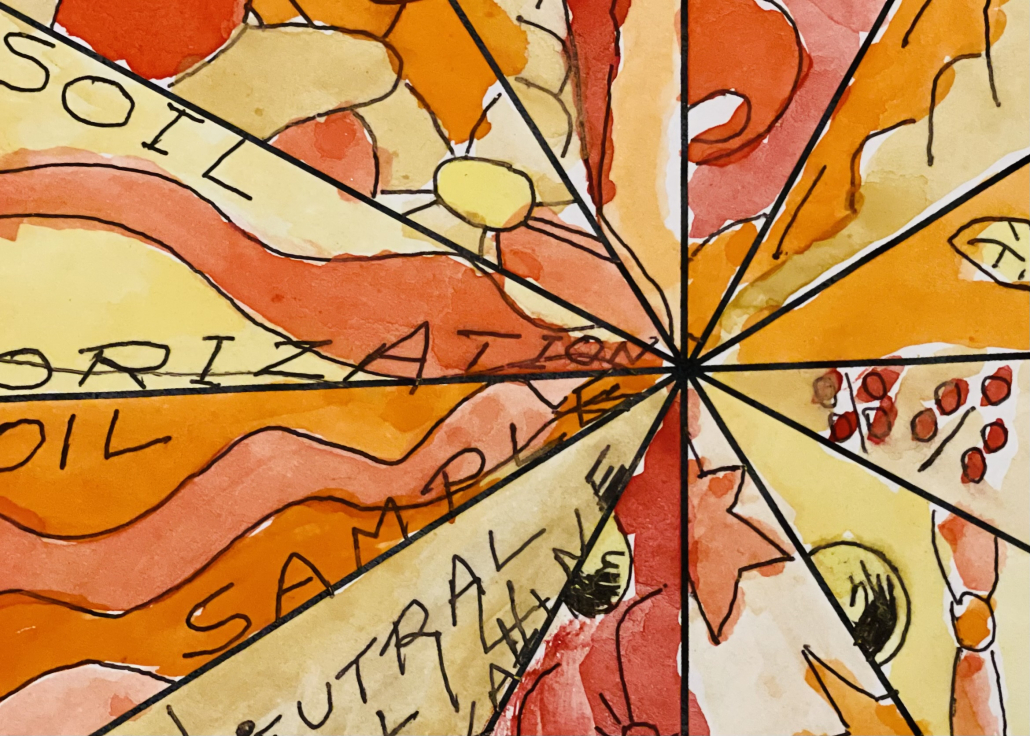Image: Mandala by Chris Lodge (detail), 2025.
‘A letter to my home’
Andrew Collis
Lent 4, Year C
Psalm 32; Luke 15:1-3,11b-32
“I was young when I left home / But I been out a-ramblin’ ’round / And I never wrote a letter to my home / To my home, Lord, to my home / And I never wrote a letter to my home // Not a shirt on my back / Not a penny on my name / Well I can’t go home thisaway / Thisaway, Lord, Lord, Lord / And I can’t go home thisaway …” (Bob Dylan, 1961/2005).
The homiletic midrash Pesiqta Rabbati (9th century) preserves a rabbinic parable that deals with the theme of repentance. “‘Return, O Israel, to YHWH your God’ (Hosea 14:2). The matter may be compared to the son of a king who was far away from his father – a hundred days’ journey.
His friends said to him, ‘Return to your father!’ He replied, ‘I am not able.’ His father sent him a message, ‘Come as far as you are able according to your own strength and I will come to you the rest of the way!’ Thus the Holy One Blessed be YHWH said, ‘Return to me and I will return to you’” (Malachi 3:7).
We might imagine Jacob (Israel itself) lost, dreaming, wrestling, found, finding. Or Jonah lost at sea. The prophet’s journey from reticence to exuberance.
Whom do we see? Someone who longs for home … dispossessed of land, family, culture … made to feel insecure about housing, the right to safe and affordable housing … someone unsure of his/her place in the world … all of us making our way home … somewhere on the return journey – to and within a wider family … It’s at least as complex as this.
“I was young when I left home / But I been out a-ramblin’ ’round / And I never wrote a letter to my home …” What might the rambler or younger son have written? Thank you. Sorry. I see it now. I love you. I haven’t forgotten you. I worried over achievements … imagining criticism and judgement instead of getting on with life … grateful of trust and tradition …
“I once was lost, but now am found …” sings a former slave trader (John Newton). Another hymn writer concludes a poetic account of salvation/new creation with the beautiful line: “Lost in wonder, love and praise” (Charles Wesley). It’s at least as complex as this.
Getting lost is both frightening and exciting. Lost time is often cause for regret, but can also be productive, as anyone who loses herself in gardening, painting, walking, conversation or prayer will attest. There are good reasons for leaving home. There are good reasons for staying put. There is also wilful disrespect, and fearful/resentful obligation.
At parable’s end, what might the father and brothers discuss, confess, reconsider? About their own family – including patriarchal inheritance laws, absent women, long-suffering hired hands/slaves and sacrificial animals? About economics, the world beyond the security of wealth and property? About sex work, sex and gender diversity, suffering and hospitality, forgiveness and celebration (freedom with and for others)? It’s at least as complex as this.
The psalmist refers to a “mercy that encircles us”. Imagine this mercy encircling the three figures in the parable. Let’s give them names. A parent figure called Generous; two adult children, Responsible and Reckless.
Reckless is a freedom-seeker and risk-taker, who learns the ways of the world; then learns to be more responsibly reckless … ultimately, to risk humiliation in the name of survival/life.
Responsible is recklessly responsible, taking on too much … and yet may learn to choose responses with intention and care … in the context of home, even Christ or Country … from which to embark on life’s great adventures.
We learn there to be Generous – in Christ, on Country … The invitation is to give (to participate in grace and peace) and to share, to share deeply, which can be both painful and transformative. At least as complex as this.
Perhaps there was a time you found yourself, little by little or suddenly, free to celebrate with others, free to enjoy a party, free to enjoy the company of another person/being – to sing and write; pray, paint and plant – free to entertain the possibility of life in all its glory. For me, ministry at South Sydney Uniting Church – this congregation-community-garden – has been such a time.
It’s time to go yet feels again like being somewhere on the return journey – to and within a wider family …
Thank you. Sorry. I see it now. I love you. I’ll remember you. I once worried over achievements … imagining criticism and judgement instead of getting on with life. With you, I found another way … grateful of trust and tradition …
So grateful of trust and tradition. Every blessing. In the name of God – Beyond us, Beside us, Within us … Amen.




